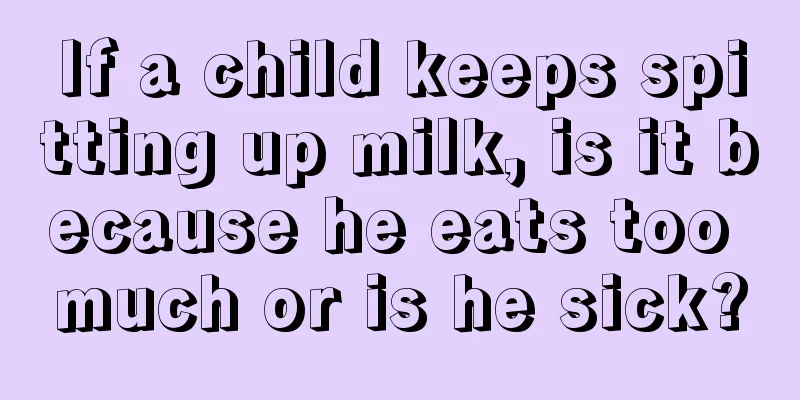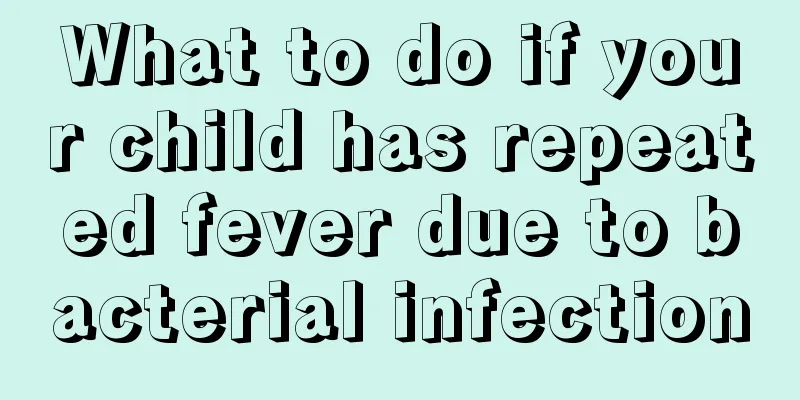If a child keeps spitting up milk, is it because he eats too much or is he sick?

|
99% of babies have spit up milk, and many new parents are often at a loss when faced with spitting up milk. Babies usually spit up shortly after feeding. Before spitting up, the baby will have physical reactions, such as uncomfortable expression, opening the mouth or stretching the neck. In this case, you must observe whether the baby has these reactions so as to control and deal with them in time to avoid affecting the baby's physical condition. So how to prevent and control baby spitting up? Spitting up is a common phenomenon in infants. There are two reasons for this: one is that it is a symptom of systemic or gastrointestinal disease; the other is that the anatomical and physiological characteristics of the infant's gastrointestinal tract make vomiting prone to occur. Generally speaking, vomiting caused by the second reason is more common. The milk taken in through the mouth first passes through a tube called the esophagus and then enters the stomach. The stomach has two doors, one is connected to the esophagus called the cardia, which is the entrance of the stomach, and the other is connected to the intestine called the pylorus, which is the exit of the stomach. The tension of the esophageal muscles in infants and young children is low, which can easily cause expansion. At the same time, the peristalsis is relatively slow, so food can easily accumulate. The cardia is relatively loose and not tightly closed, so it is easily opened by food. When there is a little more food in the stomach, it can break open the cardia and flow back into the esophagus. The pylorus is tightly closed and can be easily stimulated by food to cause spasm, which makes the exit resistance greater, and food passes slowly or with difficulty. Food then flows back from the pylorus to the cardia and breaks out. In addition, the baby's stomach does not hang down like that of older children and adults, but is in a horizontal position. This can reduce the capacity of the stomach, store less food, and also make it easier for it to return to the cardia. Due to the existence of the above factors, even under normal circumstances, if you eat too much and lie down immediately after feeding, the milk can easily rush open the cardia and return to the mouth through the esophagus, causing vomiting. If a child spits up milk occasionally and is in good spirits, he or she may not be sick. If the child vomits several times in a row and vomits every time during feeding, you should pay attention to whether the child has a fever, the condition of his bowel movements, any changes in his spirit, etc. There may be problems with the gastrointestinal tract itself, or there may be lesions in other systems. You should take your child to the hospital for examination. Spurting up of milk is usually caused by the baby inhaling air while feeding. After the air enters the stomach, because the gas is lighter than the liquid and is located at the top, it can easily break through the cardia and come out, and it will also bring out some milk, which will cause milk regurgitation. Therefore, when feeding, let the child's mouth cover the entire nipple, leaving no gaps to prevent air from entering. When feeding with a bottle, the milk should completely fill the nipple. Don't be afraid that the milk will be too strong and only reach half of the nipple, as this will make it easy for the baby to inhale air. After feeding, it is best to let the child lie on the adult's shoulder and pat the child's back with your hand to allow the inhaled air to escape. After feeding, be gentle and use less movement when picking up and putting your baby down. If you shake the baby too vigorously, it will easily cause milk to regurgitate or spit up. The amount of milk that comes out during belching is generally small and will not have much impact on the child's growth and development. It will get better naturally as the baby gets older. |
<<: How to solve the problem that children don’t like to study?
>>: How to deal with baby hiccups?
Recommend
Children with blood in stool
The chance of children having bloody stools is no...
Newborn baby has a lot of mucus? These are probably the reasons
Some mothers find that their newborns have a lot ...
Why does a baby fart and cry?
Why does a baby cry before farting? This is a ver...
What to do if your child has red spots on his tongue
What should I do if my child has red spots on his...
Sequelae of elbow fracture in children
Children's elbow fractures are mainly caused ...
What to do if your child has pockmarks on his face
In fact, generally speaking, children will not ge...
Causes of baby's forehead protrusion
It is not easy for many parents to notice that th...
How to prevent blisters on children's hands
Many parents often find blisters on their childre...
7-year-old girl has a painful lump in her breast
Breast lumps are the most typical symptom of brea...
What should I do if the beans planted by my baby become festering and burst?
Planting beans for babies is actually a common na...
Children have a fever and fart a lot and smell bad
Many children will feel that they fart a lot and ...
What can children drink to grow taller
In order to help their children grow taller, pare...
Simple obesity in children
There are many reasons for simple obesity in chil...
What to do if your baby has repeated fever due to viral cold
My baby is still very young, and I dare not give ...
What are the symptoms of nasal polyps in children?
Nasal polyps can occur not only in adults, but al...









